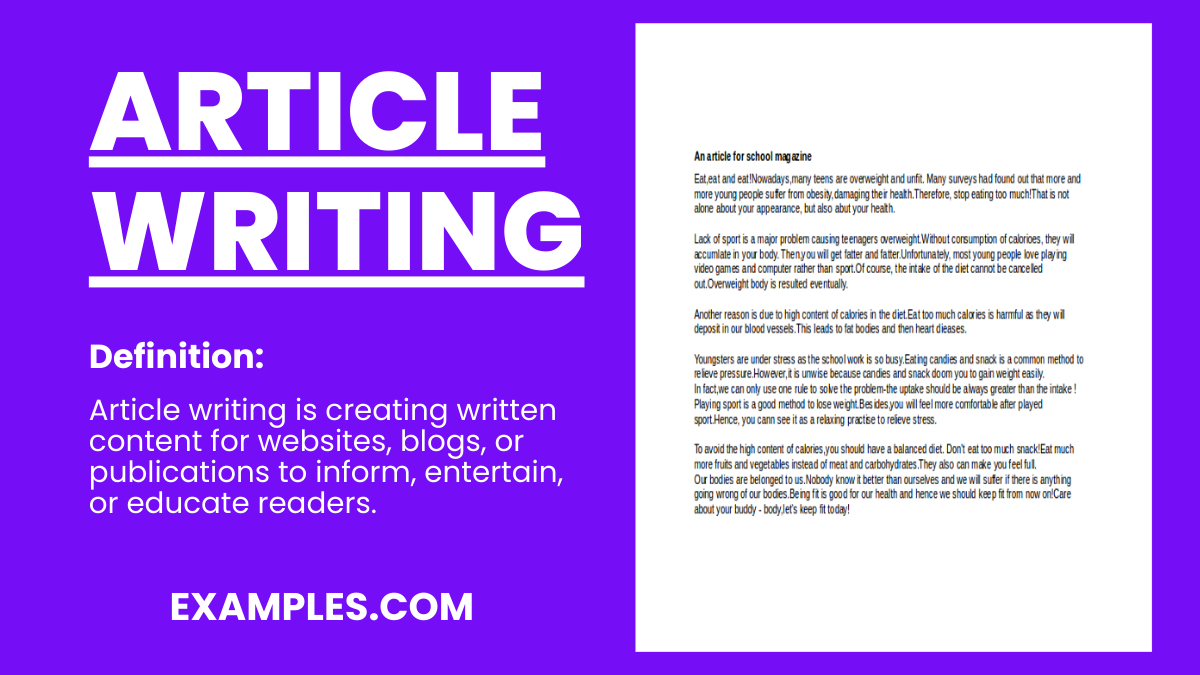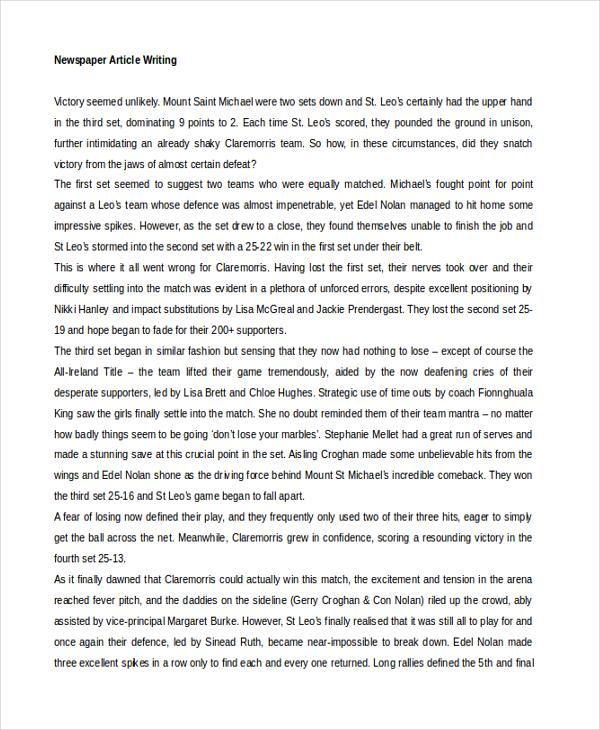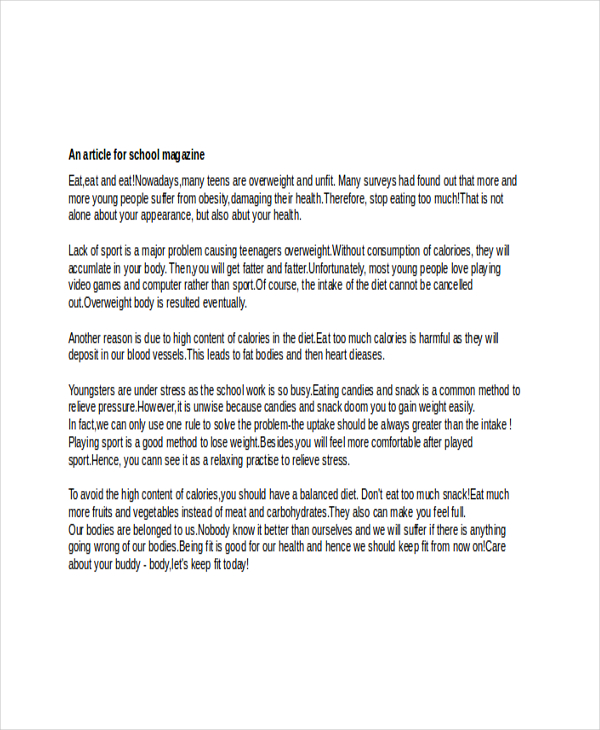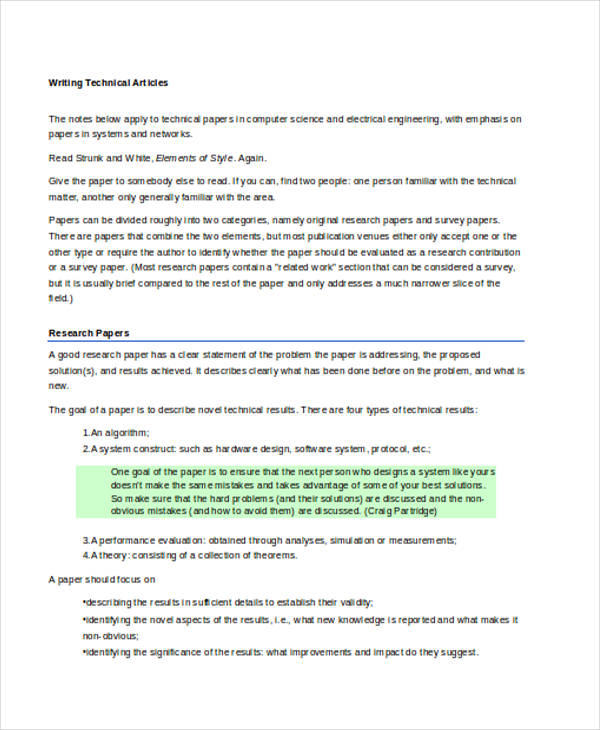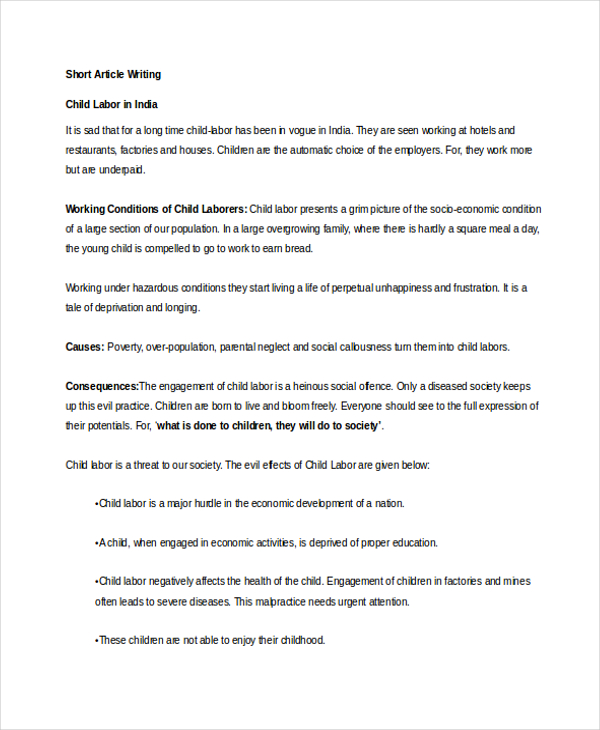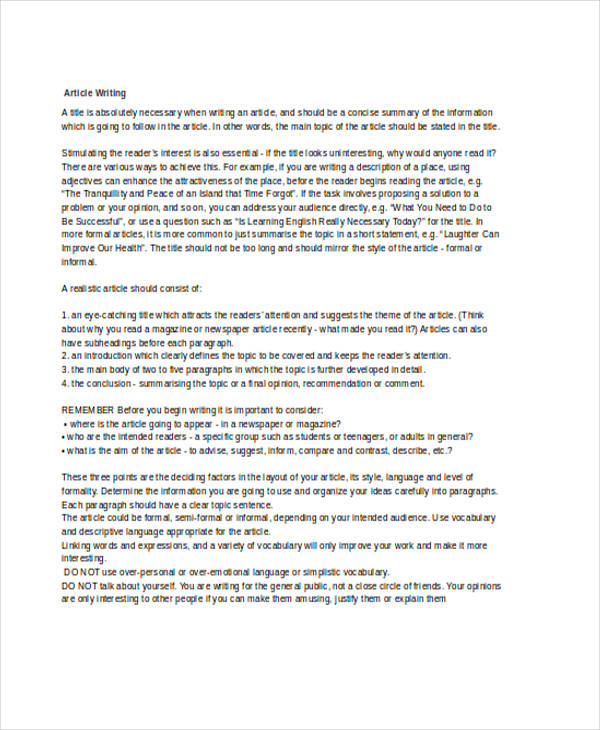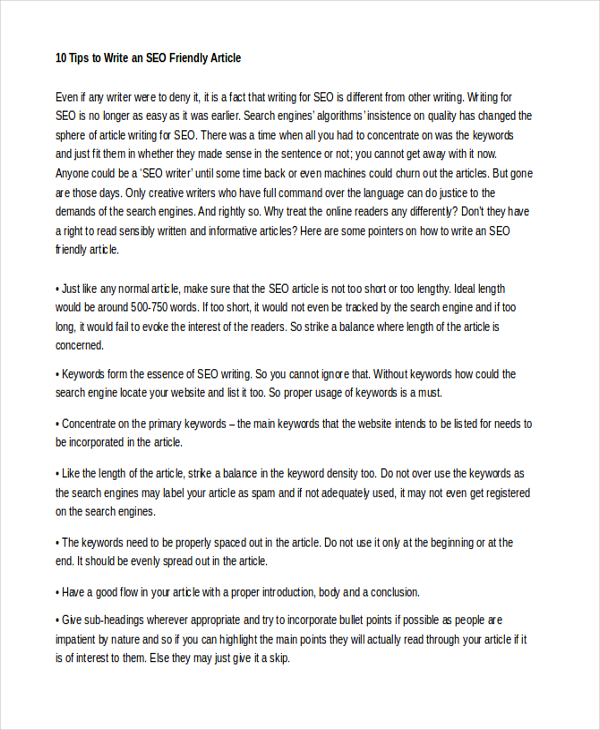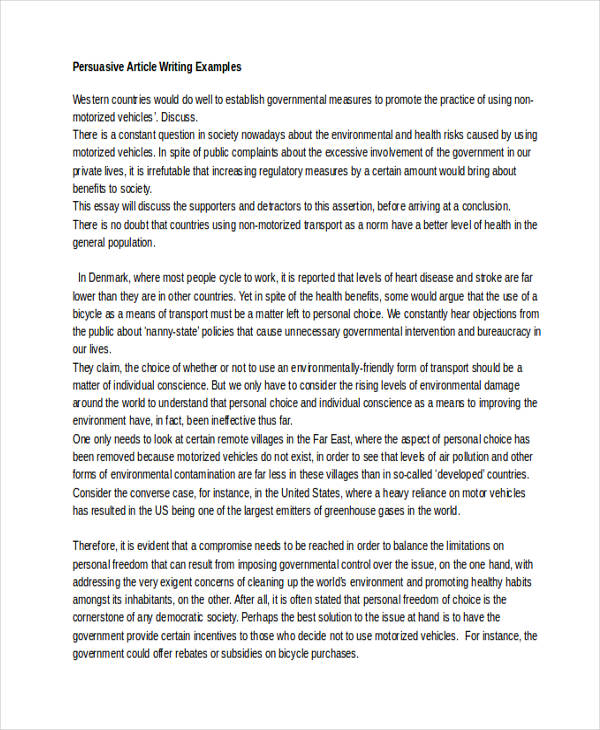45+ Article Writing Examples
Different writing compositions are used to inform various target audiences. They can be found in almost any source, which includes print media and online sources. With the advancement of modern technology, such sources have become easier to access by the day. The word article can be used to refer to a brief written composition which is often found among other compositions typically included in different publications (e.g. newspaper, magazines, online, etc.). An article can tackle different topics, depending on the writer, and is usually intended for a target audience. Using article templates can help writers maintain structure and consistency.
What Is Article Writing?
Article writing is a process of creating written pieces of content, paragraphs to reach a broad audience through different platforms. These platforms include newspapers, magazines, journals, and other publishing mediums. The goal is to engage readers by sharing information, stories, or opinions in a written format. This type of writing is common in various media outlets, making it an essential way to communicate and connect with people.
Writers present information in various ways, such as in an informative writing or argumentative writing form. Basis of information written on articles may vary. Such facts may be gathered from different sources, such as eyewitness accounts, one on one interviews, and online, among others.
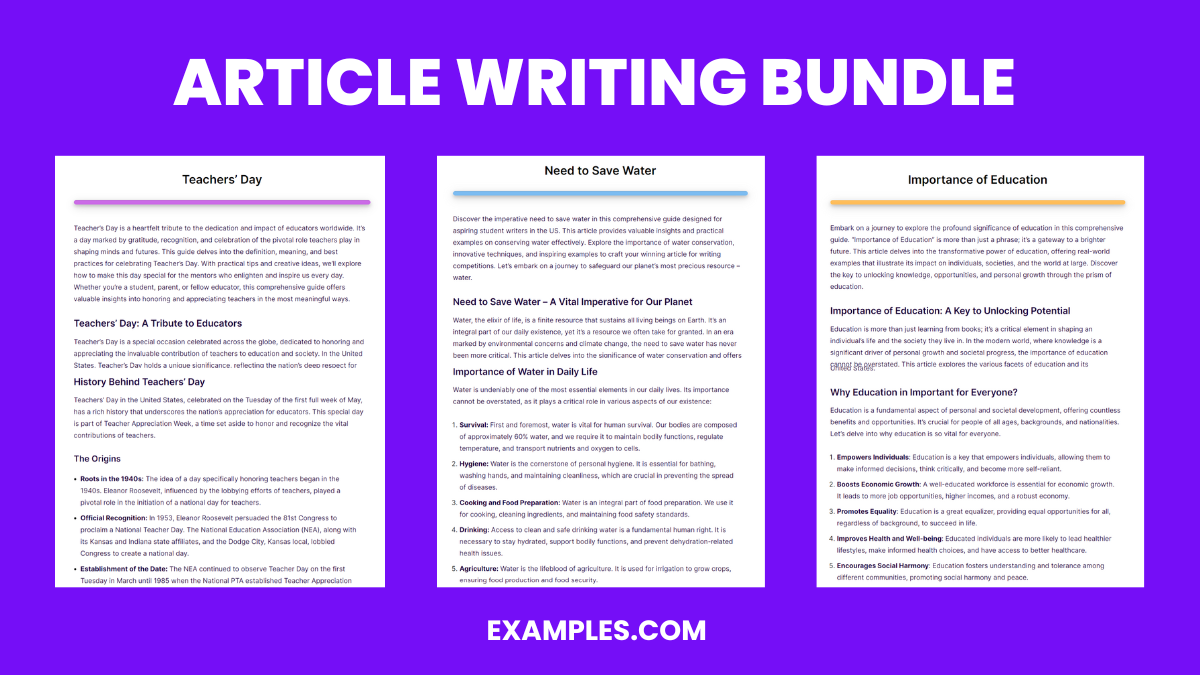
Download Sample Article Writing Bundle
Article Writing Format
An article will have an Introduction, Body Paragraphs and Conclusion. The introduction Briefly explains the topic and makes user strict to the content. The body paragraphs explains the subject in detail with evidence, examples, stats, arguments. The conclusion summarizes the important points to give overview to the reader.
1. Introduction
The introduction in article writing is the first section that sets the stage for the entire article. It serves to grab the reader’s attention and give them a reason to keep reading. This part typically includes:
Hook: Start with an interesting fact, question, or statement to grab attention.
Background Information: Provide context or background related to the topic.
Thesis Statement: Clearly state the main idea or purpose of the article.
| Good Introduction Example |
|---|
| Have you ever wondered how technology is reshaping our future? In a world where innovation unfolds at an unprecedented pace, understanding these changes is more crucial than ever. This article delves into the latest technological advancements, from AI-driven automation to groundbreaking strides in renewable energy. We will explore how these innovations are not only transforming industries but also our daily lives. As we stand on the brink of a new era, it’s essential to grasp the potential and challenges of these emerging technologies. Join us on a journey into the future, where possibilities are limitless and every advancement brings us closer to a world we once only imagined.” |
| Bad Introduction Example |
|---|
| Technology is important. There are many new technologies. This article will talk about new technologies like AI and renewable energy. These technologies are changing things. We will see how they are important in this article. |
2. Body Paragraph
In article writing, a body paragraph is a key section where the main ideas and arguments are developed. Each body paragraph typically follows this structure
Subheadings: Organize the content with relevant subheadings.
Main Points: Discuss each main point in separate paragraphs.
Supporting Information: Provide evidence, examples, and details.
Clarity and Flow: Use simple language and smooth transitions.
3. Conclusion
The conclusion in article writing is the final section where the writer wraps up the discussion. It serves several key purposes:
Summary: Recap the main arguments or points.
Final Thoughts: Conclude with a compelling closing statement or call to action.
Article Samples on Various Topics
Environment Article Samples
- Water Conservation
- Need to Save Water
- Pollution
- Global Warming and Climate Change
- Deforestation
- Environment and Nature
Society and Culture Article Samples
- Importance of Education
- Teacher’s Day
- US Independence Day
- Bullying
- Discrimination
- Poverty
- Homelessness
- Pandemics
- Women Empowerment
- Child Labor
- Globalization
Technology and Innovation Article Samples
- Artificial Intelligence (AI) – The Future of Technology
- Machine Learning
- Robotics and Automachines Manufacturing
- Wearable Technology and Its Health Applications
- 3D Printing Innovations and Applications
- Nano-technology: Advancements and Future Prospects
- Blockchain Beyond Cryptocurrency
- 5G Network Expansion and Its Impacts
- The Future of Electric and Autonomous Vehicles
- Cybersecurity: Protecting Our Digital World
- Augmented Reality (AR) and Virtual Reality (VR) in Education
- Big Data Analytics and Its Role in Business Decision Making
- Internet of Things (IoT) and Smart Home Innovations
Health and Lifestyle Article Samples
- Health is Wealth
- Junk Food
- Healthy Eating
- Impact of Social Media on Teenagers
- The Importance of Physical Fitness in Student Life
- Mental Health
Education Article Samples
- The Evaluation of Online Learning and its Impacts
- The Role of Technology in Modern Education
- Road Safety
Articles Writing Examples & Templates in PDF and DOC
Newspaper Article Writing Example
Creative Article Writing for School
Technical Article Writing Example
Short Article Writing Example
Medical Article Sample Writing Example
Sample Article Writing Example
Free SEO Article Writing Example
Persuasive Article Travel Example
Importance of Article Writing
Articles deliver information effectively, like other persuasive writing compositions. Which explains why article writing is an important skill which needs to be developed. The process of article writing, as compared to writing other compositions can be tricky.
For example, a news article needs to be written without carrying any biased opinion from the writer. Article writing requires the writer to gather accurate information from reliable sources of information. You may also see essay writing examples
Basically, article writing helps the writer develop both the writing and data gathering writing skills—which in turn develops his/her communication skills. At the end of the day, article writing, or writing in general, helps in improving an individual’s communication skills in general.
Types of Article Writing
Article writing is a versatile form of writing used in various contexts, including journalism, blogging, academic writing, and more. Here are some examples of different types of articles:
1. News Article
News articles report current events and provide facts and information about newsworthy topics. They typically follow the “inverted pyramid” structure, with the most important information presented at the beginning.
Example: “COVID-19 Vaccination Drive Reaches Milestone with 1 Billion Doses Administered Worldwide”
2. Feature Article
Feature articles offer in-depth coverage of a particular topic, often with a more narrative or storytelling approach. They provide background, analysis, and context, going beyond the surface details.
Example: “The Hidden Wonders of the Amazon Rainforest: A Journey into Biodiversity and Conservation Efforts”
3. Opinion or Editorial Article
Opinion articles express the author’s viewpoint on a particular issue. They are often persuasive in nature and present arguments or personal perspectives.
Example: “Why We Should Prioritize Renewable Energy Sources for a Sustainable Future”
4. How-To Article
How-to articles provide step-by-step instructions on how to perform a specific task, solve a problem, or achieve a goal.
Example: “How to Start Your Own Vegetable Garden: A Beginner’s Guide”
5. Review Article
Review articles assess and provide an opinion on a product, service, book, movie, or any subject of interest. They often include an evaluation of the item’s pros and cons.
Example: “Film Review: ‘The Trial of the Chicago 7’ – A Riveting Dive into 1960s Political Turmoil”
6. Academic or Research Article
Academic articles are scholarly publications that present research findings or discuss academic topics. They often follow specific formats and are published in academic journals.
Example: “The Impact of Climate Change on Coral Reefs: A Comprehensive Ecological Study”
7. Blog Post
Blog articles cover a wide range of topics and are typically written in a conversational, engaging style. They are commonly found on personal blogs, corporate blogs, and news websites.
Example: “10 Tips for Effective Time Management in a Remote Work Environment”
8. Travel Article
Travel articles describe and share experiences about specific travel destinations, providing insights, tips, and recommendations for travelers.
Example: “Exploring the Rich History and Culture of Rome: A Traveler’s Guide”
9. Technical or Instructional Article
Technical articles focus on complex or specialized subjects and are often used in industries like technology, science, or engineering. They explain technical concepts or processes.
Example: “A Comprehensive Guide to Data Encryption Algorithms for Cybersecurity Professionals”
10. Entertainment or Lifestyle Article
These articles cover topics related to entertainment, lifestyle, and popular culture, including celebrity news, fashion, food, and more.
Example: “10 Must-Watch Movies for Film Buffs this Summer”
How Do I Write a Good Article? – Step by Step Guide
Understand Your Audience and Purpose
- Identify Your Readers: Understand who your audience is – their interests, level of understanding, and what they are looking for in an article.
- Define Your Purpose: Clearly state your objective. Are you informing, persuading, or entertaining?
Choose a Compelling Topic
Select a topic that resonates with your audience. It should be relevant, timely, and offer a fresh perspective.
Research and Gather Information
- Source Credible Information: Use reliable sources to gather facts, statistics, and other pertinent data.
- Organize Your Research: Group similar information together for coherence.
Create an Outline
An outline helps in organizing thoughts and ensuring a logical flow. It typically includes:
- Introduction
- Body Paragraphs – Sub Headings (H2), Child Headings (H3)
- Conclusion
Write the Article
- Introduction: Start with a hook – a fact, question, or statement that grabs attention. Briefly outline what the article will cover.
- Body Paragraphs: Each paragraph should focus on a single idea, supported by facts, examples, and explanations.
- Transitions: Use smooth transitions to maintain flow and coherence.
- Conclusion: Summarize the main points and leave the reader with something to think about.
Starting an Article
What is written at the beginning of an article?
At the beginning of an article, you typically find an introduction. This part is crucial because it aims to grab the reader’s attention. It usually starts with something interesting like a surprising fact, a question, or a short story related to the topic. The introduction also gives a brief idea of what the article is about and sets the tone for the rest of the content.
Conclusion
Crafting a well-written article requires planning, research, and a keen understanding of your audience. By following this format, you can create articles that are not only informative and engaging but also resonate with your readers.
| Note |
|---|
|
What is the Easiest way to write an Article?
To write an effective article, first choose a topic that aligns with your interests and knowledge. Clearly determine your article’s purpose, such as informing or persuading. Conduct thorough research from reliable sources to support your content. Plan your article with a structured outline. Begin with an engaging introduction that includes a clear thesis statement. In the body, develop focused paragraphs, each addressing a single point, supported by evidence like facts or statistics. Write using clear, simple language for better understanding. Ensure your paragraphs smoothly transition to maintain flow. Conclude by summarizing the main points and restating the central message.
Common Mistakes to Avoid in Article Writing
- Ignoring the Audience: Not tailoring the content to the interests and understanding of your target readers.
- Lack of Clear Purpose: Not having a clear goal or message in your article.
- Poor Structure: Failing to organize the article in a logical, coherent manner.
- Overcomplicating Language: Using complex words or sentences that confuse readers.
- Repetitive Content: Repeating the same ideas or examples.
- Inadequate Research: Not backing up your points with accurate and reliable information.
- Plagiarism: Copying someone else’s work without giving credit.
- Ignoring SEO Principles: Not including relevant keywords for online articles, which helps in search engine ranking.
- Skipping Proofreading: Not checking for spelling, grammar, or punctuation errors.
- Neglecting a Strong Conclusion: Failing to summarize the main points or ending the article abruptly.
Avoiding these common mistakes can significantly improve the quality and effectiveness of your article writing.
Do’s and Don’ts of Article Writing
| Do’s | Don’ts |
|---|---|
| Identify and understand your target audience. | Neglect the interests and needs of your readers. |
| Clearly define the purpose of your article. | Write without a clear goal or message. |
| Use a coherent and logical structure. | Disorganize your ideas and points. |
| Write in simple, clear language. | Overcomplicate with jargon and complex sentences. |
| Back up points with reliable research. | Use unverified or false information. |
| Include relevant keywords for SEO. | Ignore SEO practices in online articles. |
| Proofread for spelling and grammar errors. | Publish without checking for mistakes. |
| Provide a strong, summarizing conclusion. | End abruptly without summarizing key points. |
| Use original content and cite sources. | Plagiarize or use others’ work without credit. |
| Revise for clarity and coherence. | Overlook the importance of editing and revising. |
Quick Overview on How to Write an Article – Tips & Tricks
Discover key tips for writing an engaging article: select a relevant topic, conduct thorough research, create a clear structure, and write with simplicity for an impactful, reader-friendly piece.
- Understand Your Audience: Tailor to audience interests and knowledge.
- Choose a Clear, Relevant Topic: Focus on specific, timely topics.
- Organize Your Ideas: Structure with clear outline and logical flow.
- Engaging Introduction: Start with an interesting hook; set tone.
- Strong Body Content: Maintain one idea per paragraph; use subheadings.
- Concise and Clear Language: Use simple language and active voice.
- Incorporate Research and Examples: Back points with research; cite sources.
- SEO Optimization: Include relevant keywords; write concise meta descriptions.
- Edit and Proofread: Review for errors; seek feedback.
- Effective Conclusion: Summarize key points; end impactfully.
- Stay Consistent: Write regularly; learn from feedback.
What Is An Article?
An article is a written piece that informs, educates, entertains, or persuades readers about a specific subject. It can take various forms, including news reports, opinion pieces, how-to guides, or in-depth features. Articles are published in newspapers, magazines, websites, and academic journals, offering information, analysis, and commentary to a wide audience.
What Makes a Strong Article?
A strong article is well-researched, clearly written, engaging, and informative. It should have a compelling introduction, a coherent structure, and a conclusive ending.
Are Articles Hard to Write?
Writing articles can be challenging but rewarding. It requires research, planning, and the ability to clearly convey ideas to your audience.
How Does an Article Look Like?
An article typically has a clear title, an engaging introduction, body paragraphs with headings, and a summarizing conclusion. It’s structured logically to guide the reader.
How many words should there be in an article?
The word count for an article can vary widely, typically ranging from 500 to 2000 words, depending on the topic, audience, and publication requirements.
Mastering article writing involves understanding your audience, choosing engaging topics, structuring your content logically, and using clear language. Remember to research thoroughly, use SEO strategies, and edit meticulously. By following these guidelines and tips, you can craft compelling articles that captivate and inform your readers, enhancing your writing skills in the process.


